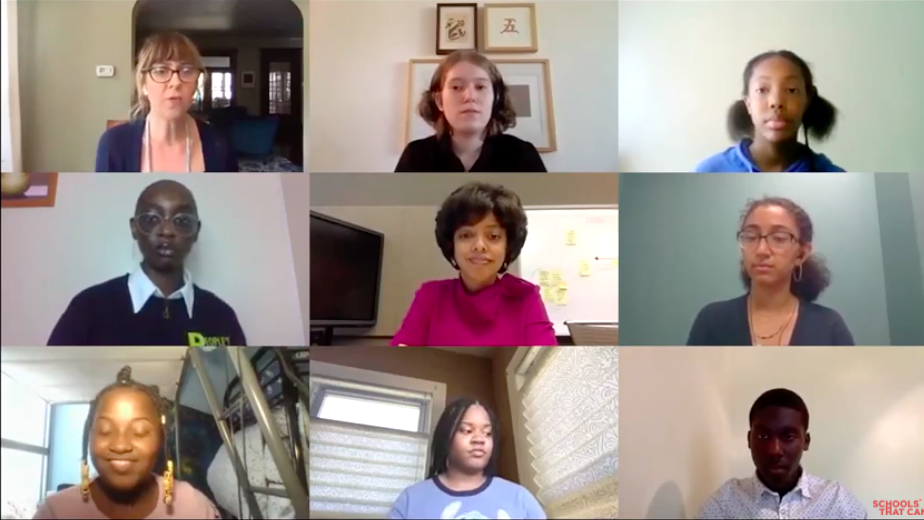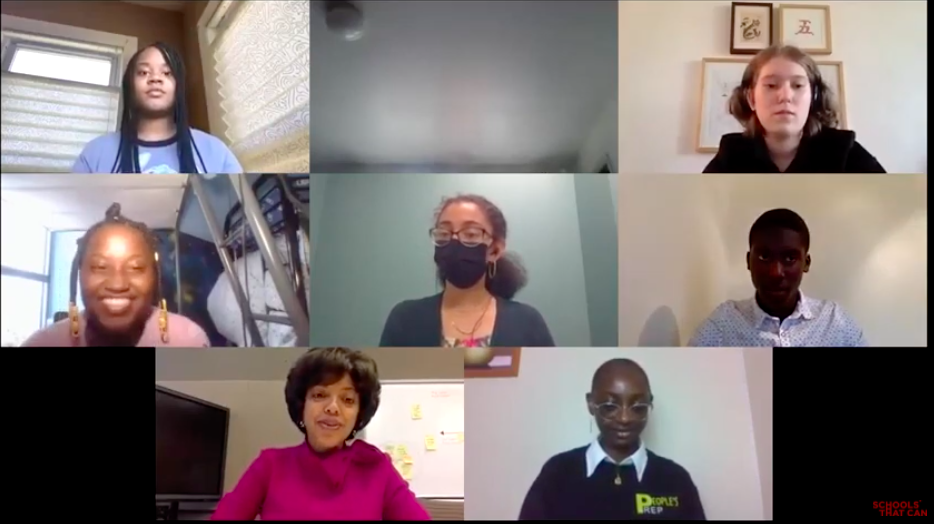 Following the first-ever virtual ceremony for the RFK Urban Education Awards, hosted in partnership by Schools That Can and Robert F. Kennedy Human Rights, a panel of middle school and high school students from New York, Newark, Chicago, and Pittsburgh gathered on Zoom—not for a class or to listen, but to lead. “It feels good for a student in this pandemic to be appreciated,” said Omotolani, a student at People’s Preparatory Charter School in Newark, a panelist, and student winner of the 2021 RFK Urban Education Awards. The pandemic has been a lot, Omotolani said, and the opportunity for conversation that is student-centered is a means of appreciating and encouraging them.
Following the first-ever virtual ceremony for the RFK Urban Education Awards, hosted in partnership by Schools That Can and Robert F. Kennedy Human Rights, a panel of middle school and high school students from New York, Newark, Chicago, and Pittsburgh gathered on Zoom—not for a class or to listen, but to lead. “It feels good for a student in this pandemic to be appreciated,” said Omotolani, a student at People’s Preparatory Charter School in Newark, a panelist, and student winner of the 2021 RFK Urban Education Awards. The pandemic has been a lot, Omotolani said, and the opportunity for conversation that is student-centered is a means of appreciating and encouraging them.
Over the course of the panel, students shared what they’d learned about themselves over the course of a tumultuous academic year, one punctuated by COVID-19, shifts to remote learning and back again, and real-time renegotiations of how to make education engaging and responsive.
“One thing I definitely learned is [that] my learning experience is best when I’m actually enjoying the learning side of things,” said Oluwasola, a student from Science Park High School in Newark. “I learn best when I’m enjoying the learning.” Some of the best times at school, Olo explained, are getting to engage with peers and having fun with learning. When students enjoy the learning process, Olo said, and learn material that applies to their lives, it makes them motivated, excited to learn, and eager to come to school, a facet of learning it felt difficult to capture online.
Even on the academic side, online learning was front and center in conversation—alongside the need for student agency and a supportive environment where students, teachers, and counselors are working together. Aneesha, a student at City Charter High School in Pittsburgh, explained that some teachers went above and beyond to ensure students stayed engaged, even calling students via phone to encourage them to come to class. “I thought I was a very good worker, I thought I was able to turn in work on time, very punctual, but it became a struggle,” Aneesha said. “I had to really work on myself during that time.” That self-work was aided by leaning on other people, including talking to friends virtually through Google Meets, and staying connected with teachers and counselors.
Other students pointed out what they’d like to see more of in order to better prepare them for their futures. G’shauni, a student at Polaris Charter Academy, said schools should prioritize “a choice to students—to get to learn what they want to learn.” Learning what one is interested in, or what applies to everyday life, keeps students engaged and lowers the stress of learning. To that end, G’shauni pointed out that the breaks between classes at her school are an important chance to do work when it’s fresh in your mind, or have time to tend to your mental health and reflect. “You have a chance to breathe, do your work, or talk to your peers,” G’shauni added. It’s something that should be carried out of schools and into society as a whole moving forward.
 Toward the end of the hour, students tackled a question that’s dominated news headlines over the past several weeks: Whether Critical Race Theory should be taught in schools. What unfolded was a dynamic conversation on how crucial it is to teach students about elements of the real world—and to give them space to think aloud about them. This includes systemic racism, something many of them discussed being directly impacted by in the context of societal structures they exist in and their own lived experiences. Jada, a student from Chicago Tech Academy, underscored how starting early to educate people would create less ignorance. Teaching the reality of history in school gives students the opportunity to hear perspectives beyond their immediate family members and develop their own opinions, Jada added. “Racism is everywhere—it’s embedded into laws,” G’shauni said.
Toward the end of the hour, students tackled a question that’s dominated news headlines over the past several weeks: Whether Critical Race Theory should be taught in schools. What unfolded was a dynamic conversation on how crucial it is to teach students about elements of the real world—and to give them space to think aloud about them. This includes systemic racism, something many of them discussed being directly impacted by in the context of societal structures they exist in and their own lived experiences. Jada, a student from Chicago Tech Academy, underscored how starting early to educate people would create less ignorance. Teaching the reality of history in school gives students the opportunity to hear perspectives beyond their immediate family members and develop their own opinions, Jada added. “Racism is everywhere—it’s embedded into laws,” G’shauni said.
Omotolani explained “I grew up seeing everybody Black.” When she moved to America, she first learned about racism as a victim of it, with no context for the abuse she was experiencing. Being educated about racism and the unfiltered version of American history would’ve protected her from having to research why the system is against her, and googling things like “what is racism?” or why someone called her a certain name. “It’s in the system. And if it’s in the system, teach about it; don’t ignore it because it’s uncomfortable,” Omotolani said. At 14, she began talking about racism in her spoken word work, and later, on her Instagram, in order to help peers better understand. If a teenager can do that, “adults should take it upon themselves to do that, too.”
Over and over, student-led conversations underscore the necessity of students as leaders and partners in learning. They aren’t just the future of what the world will look like; they’re leading, changing, and creating a better world—and better practices surrounding education—now. Explore the full session below.

